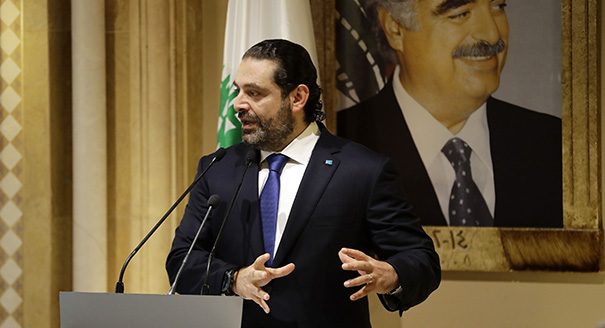On November 22, while receiving dignitaries for Independence Day at Lebanon’s presidential palace, Prime Minister Saad Hariri suddenly left the reception line for a few minutes. Supposedly, this was because he needed to drink a glass of water. The real reason, however, was that he had noticed the arrival of Syria’s ambassador to Lebanon, Ali Abdel-Karim Ali, at the head of an embassy delegation, and he did not want to have to shake hands with the envoy.
This was the second year in a row that Hariri had done such a thing. But this year the context was very different. In November 2017, Hariri was a full-fledged prime minister. He headed a functioning “national unity” government formed after a consensual presidential election a year earlier. And he was preparing to lead his large parliamentary bloc into legislative elections scheduled for May 2018.
Syria’s situation was different as well in 2017. The regime of President Bashar al-Assad was in a difficult situation then as it had yet to regain control over a large number of areas controlled by the opposition. However, in the interim many of those areas have since been recaptured by the regime, with the exception of Idlib Governorate and areas under Turkish and Syrian Kurdish control. There is now talk of rebuilding the economy, but also the regime’s networks, in a process centered on rewriting some provisions of the constitution before heading toward a presidential election in 2021.
Hariri, for his part, is much weaker than he was. His parliamentary bloc lost seats in the May elections and several of his Sunni rivals who support the Syrian regime have been voted into parliament. For seven months he has struggled to form a cabinet through a formula that would reflect the new political landscape, while allowing him to retain a minimal level of political power and preserve what remains of his prestige. Increasingly, there is talk that Hariri may be compelled to step down and allow someone else to head a new government.
A superficial explanation for the stalemate is that the domestic balance of power resulting from the elections produced realities that cannot be readily translated into a new government formula that would satisfy all parties. Indeed, for months Hariri has had to navigate a series of political obstacles by reapportioning shares in his government to address the demands made of him by all sides. Yet just as his government was about to be formed, Hezbollah set a condition that brought the whole process to a halt and showed that the problem was more profound than the matter of shares.
In early November, Hezbollah’s secretary general, Hassan Nasrallah, demanded that a pro-Syrian Sunni minister be appointed to the government, and that he come out Hariri’s cabinet share. Nasrallah underlined that this condition had been set from the start of consultations on a new government, which Hariri later admitted. But the prime minister-designate added that he had told President Michel Aoun that he rejected such a request as politically suicidal for him.
What Hariri did not say, however, was that Hezbollah’s condition was from the start echoed and amplified by the Syrian regime. The Syrians had underlined to their interlocutors in Beirut that Hariri would not become prime minister if he failed to commit himself to reestablishing the “privileged relationship” that had existed between Lebanon and Syria prior to 2005, and that had been severely damaged after the assassination of Saad Hariri’s father Rafik that year. Syrian involvement in the crime was strongly suspected.
Behind Hezbollah’s insistence that a pro-Assad Sunni be included in the government, and Hariri’s stubborn refusal to accept this, one has to look at regional complicating factors, as is often the case in Lebanese politics. Since the elections, the regional situation has evolved in directions that have at times led rival Lebanese camps to wager on conditions that would enhance their bargaining power.
For instance, the new set of U.S. sanctions imposed on Iran have led many to believe that the regime in Tehran could be severely weakened. They came as more sanctions were being placed on Hezbollah. Such developments could be a reason why the party may now be tempted to employ Lebanon as a shield, both human and economic, to signal that if Hezbollah must sink, so too will Lebanon. This could be a risky gamble, however, since if Hariri were forced to abandon forming a government, Hezbollah could find itself without a convenient buffer between the party and the international community. Because Lebanon is in dire economic straits, any delay could also precipitate an economic collapse in which the party’s social base would suffer more than most, leaving the door open to risks of social revolt in a country so far spared the Arab upheavals.
Then there is Syria. With the prospect of a regime victory in Idlib Governorate looming, and Russia insisting on rehabilitating Syrian President Bashar al-Assad through a reconstruction process, Lebanon could well be the first country that will have to adapt to this new reality. Hariri’s declared desire for Lebanon to profit from Syrian reconstruction puts the prime minister-designate in an even more vulnerable position. That is why cynical commentators have observed that Hariri, even if he sought to escape greeting the Syrian embassy delegation on Independence Day, may one day have to drink the poisoned chalice of embracing Bashar al-Assad himself—at least if he wants to return to power and govern.






